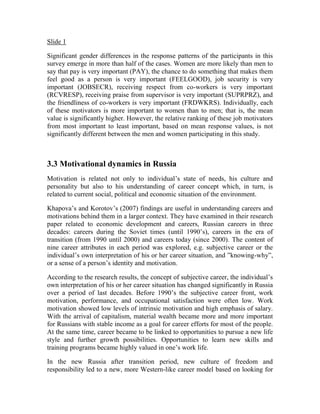Report
Share

Recommended
Recommended
More Related Content
Similar to Motivation hr project notes
Similar to Motivation hr project notes (20)
1Running Head NATURE OF WORK 7NATURE OF WORK .docx

1Running Head NATURE OF WORK 7NATURE OF WORK .docx
384 Part 4 Clobal Human Resources Management . High indivi.docx

384 Part 4 Clobal Human Resources Management . High indivi.docx
Anıl Sural - Difference Between New Graduate Manager and Experience Manager

Anıl Sural - Difference Between New Graduate Manager and Experience Manager
A Study of Personality of Secondary School Students in Relation to Frustration

A Study of Personality of Secondary School Students in Relation to Frustration
Motivation hr project notes
- 1. Slide 1 Significant gender differences in the response patterns of the participants in this survey emerge in more than half of the cases. Women are more likely than men to say that pay is very important (PAY), the chance to do something that makes them feel good as a person is very important (FEELGOOD), job security is very important (JOBSECR), receiving respect from co-workers is very important (RCVRESP), receiving praise from supervisor is very important (SUPRPRZ), and the friendliness of co-workers is very important (FRDWKRS). Individually, each of these motivators is more important to women than to men; that is, the mean value is significantly higher. However, the relative ranking of these job motivators from most important to least important, based on mean response values, is not significantly different between the men and women participating in this study. 3.3 Motivational dynamics in Russia Motivation is related not only to individual’s state of needs, his culture and personality but also to his understanding of career concept which, in turn, is related to current social, political and economic situation of the environment. Khapova’s and Korotov’s (2007) findings are useful in understanding careers and motivations behind them in a larger context. They have examined in their research paper related to economic development and careers, Russian careers in three decades: careers during the Soviet times (until 1990’s), careers in the era of transition (from 1990 until 2000) and careers today (since 2000). The content of nine career attributes in each period was explored, e.g. subjective career or the individual’s own interpretation of his or her career situation, and ”knowing-why”, or a sense of a person’s identity and motivation. According to the research results, the concept of subjective career, the individual’s own interpretation of his or her career situation has changed significantly in Russia over a period of last decades. Before 1990’s the subjective career front, work motivation, performance, and occupational satisfaction were often low. Work motivation showed low levels of intrinsic motivation and high emphasis of salary. With the arrival of capitalism, material wealth became more and more important for Russians with stable income as a goal for career efforts for most of the people. At the same time, career became to be linked to opportunities to pursue a new life style and further growth possibilities. Opportunities to learn new skills and training programs became highly valued in one’s work life. In the new Russia after transition period, new culture of freedom and responsibility led to a new, more Western-like career model based on looking for
- 2. choices. Today’s Russians like to be intellectually challenged, recognized, socially important, internationally and domestically visible and are concerned with work- life balance. Continuous professional and personal growth becomes an important part of individual’s engagement in work-related activities with early achievement of a high level responsibility. Although employee loyalty is decreasing, unlike in the transition years, decisions about switching jobs are now more likely to be associated with expected future opportunities rather than with pure monetary rewards. Subjective career is now associated with the feeling of importance, meaning, intellectual challenge, and opportunities to further growth not differing from other European countries. (Khapova & Korotov 2007.) (J.Linz, 2012) (Maaniitty, 2012) Reference List J.Linz, S. (2012). Motivating Russian Workers: Analysis of Age and Gender Differences. Michigan State University , Economics. Maaniitty, T. (2012). Saimaa University of Applied Sciences, Business Administration .